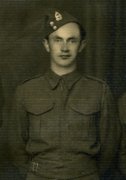
John Palmer of D Company was part of a ten-man section belonging to 17 Platoon left behind in dense bush near the foot of the steep Mavroneri Gorge (Greece) in 1941. After a brief frantic fight with German forces the order to withdraw was passed along Battalion lines. It was a dark wet and windy night and word never reached the section to which John Palmer belonged.
In the final part of this three part interview John talks about their plans to head for the coast and make their way to Turkey. He recalls the large German convoy they had to avoid, the Germans operatic singing, potato patches, avoiding being shot and then ultimately being captured and interment as a prisoner of war.
Transcript (edited)
Coming back, the day we climbed to the top of the round mountains, we saw the first two scouts of the German convoy coming through the valley. We could see them, maybe a couple of miles away I suppose, two black specs. From that day on for twenty four hours a day, this convoy, German's convoy, because it was the only road through you see, day in and day out. And ah, where we were, the road was here, the river was here, the hill was here like that you see. How we wanted to get down, down to the coast, somehow, because we couldn't get down this way. We split up in pairs to find our own way across the road. That's right, we'd seen a tree way in the distance and we were to meet there 3 o'clock the next afternoon. So okay. The corporal and I, we got together. It was about a hundred yards I suppose from the road. There was a potato patch down by the road. I remember both of us crawling through the rows of potatoes till we got on the edge of the road. This is night time. And periodically, the convoy stopped, we presume because it was a mountainous trail to let the front lot get to the top you see, and then they'd carry on afterwards. And every so often the convoy would stop, that's right, and all the lights would go out, the whole convoy. Someone would blow a whistle, the lights come on and away they went. While we were waiting there were troop carriers, that's right, and the singing you've never, honest mate you've never heard anything like it. It was semi-classical singing, opera stuff. And it was beautiful. The evening was a clear starry night, you know. We were laying in between the rows of potatoes listening to the singing. Well that's when the convoy stopped, you see. So we said we'd have to get across the road. The convoy stopped, the lights went out so corporal says, "Here we go." So we're off across the road. As soon as we hit the road the whistle went, the lights went on and we tumbled down the other side of the road and there was a paddock or whatever. I forget how far, we ran for our lives and expected to be shot. Which didn't eventuate. Anyway, we found an old shed, with fern or whatever, we stayed there the night, we slept there. The next day we had to get across the river. So we eventually found a fording place, we got across the river. Arrived at this tree, six of us did but two didn't arrive. So we waited and waited and waited, we left a note saying we're off we can't wait for you any longer. The idea then was to make our way down to the coast, steal a boat or whatever and off to Turkey and be interned you see. That's when we ran into this, they must've been a labour corps, they were fixing up the roads. The roads had been bombed, you know. And this officer was there. Because the Greeks, they were dark like us Maoris and a lot of them wore more or less the same uniform as us. So we decided well the only thing to do was just carry on saying we were Greeks forgetting that we had a New Zealand patch on here. We walked past and they just looked at us, ignored us except the officer. And there's something, being in the army, you know, it's automatic you hear this word ‘halt' you just automatically halt. And he said "Halt, for you the war's over."
John Palmer, Ngāti Raukawa, Ngāti Toa Rangatira, Ngāti Tūwharetoa (1918-2011), interviewed by Mathew Devonald.
Family collection. Courtesy of Hanatia Palmer.

Comments (0)